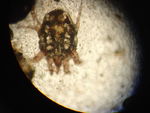Difference between revisions of "Psoroptes cuniculi"
| Line 22: | Line 22: | ||
|} | |} | ||
| − | [[Image:Psoroptes cuniculi.jpg|150px|thumb|right|'''Psoroptes cuniculi ( | + | [[Image:Psoroptes cuniculi.jpg|150px|thumb|right|'''Psoroptes cuniculi (Sourced from Joel Mills, Wikimedia Commons) ''']] |
''Psoroptes cuniculi'' is a [[:Category:Non-Burrowing Mites|non-burrowing parasite]], of the class ''Arachnida'' and is seen worldwide. It is found on the ears of the infected host and is generally seen in relatively small amounts. However, occasionally they will proliferate and the infection will become severe resulting in [[Psoroptic Mange|mange]]. | ''Psoroptes cuniculi'' is a [[:Category:Non-Burrowing Mites|non-burrowing parasite]], of the class ''Arachnida'' and is seen worldwide. It is found on the ears of the infected host and is generally seen in relatively small amounts. However, occasionally they will proliferate and the infection will become severe resulting in [[Psoroptic Mange|mange]]. | ||
| − | |||
{| cellpadding="10" cellspacing="0" border="1" | {| cellpadding="10" cellspacing="0" border="1" | ||
| Line 32: | Line 31: | ||
|- | |- | ||
|} | |} | ||
| − | |||
==Hosts== | ==Hosts== | ||
Revision as of 05:46, 4 August 2010
| This article has been peer reviewed but is awaiting expert review. If you would like to help with this, please see more information about expert reviewing. |
| Psoroptes | |
|---|---|
| Kingdom | Animalia |
| Phylum | Arthropoda |
| Class | Arachnida |
| Sub-class | Acari |
| Order | Sarcoptiformes |
| Family | Psoroptidae |
| Genus | Psoroptes |
| Species | Psoroptes cuniculi |
| Also known as: | Ear canker mite |
Psoroptes cuniculi is a non-burrowing parasite, of the class Arachnida and is seen worldwide. It is found on the ears of the infected host and is generally seen in relatively small amounts. However, occasionally they will proliferate and the infection will become severe resulting in mange.
| Predilection site | Ears |
Hosts
Commonly of rabbits, but also seen in goats, sheep and horses.
Identification
Adults mite grow up to around 0.75mm in length. The legs are long and jointed, bearing suckers on the ends. The adults also have very characteristic pointed mouthparts.
It is highly likely that P. cuniculi is simply an adaptation of the species Psoroptes ovis.
Life Cycle
The egg hatches forming an hexapod larvae. The larvae then moults forming a protonymph, which further moults to form a tritonymph, which then moults to become an adult. Each stage takes around two days, totalling to an approximate 10 day life cycle.
